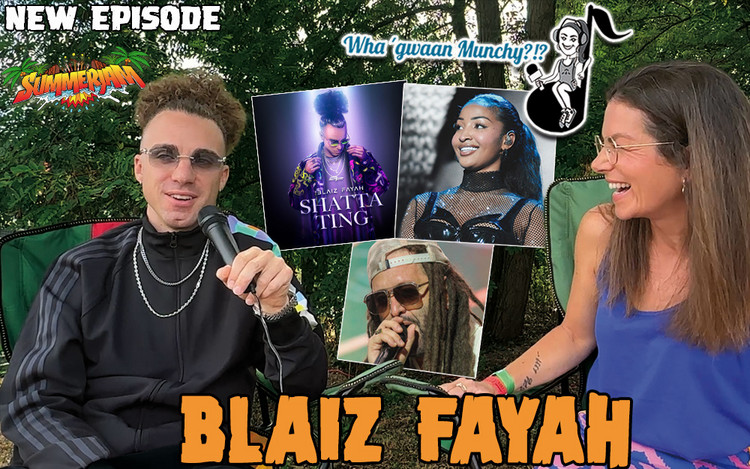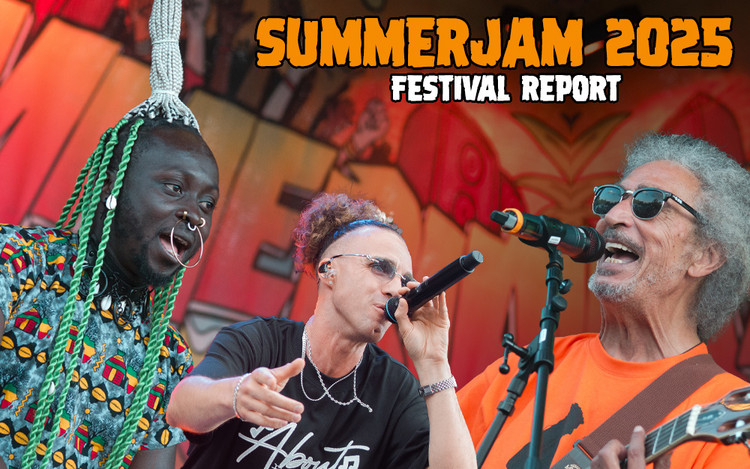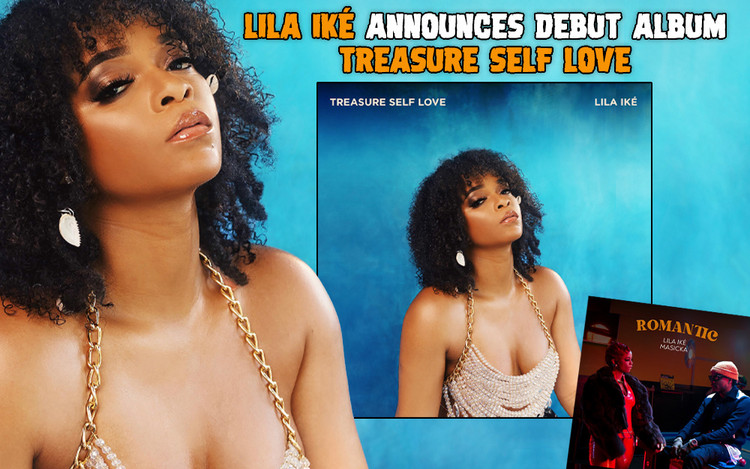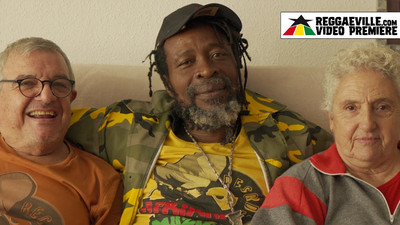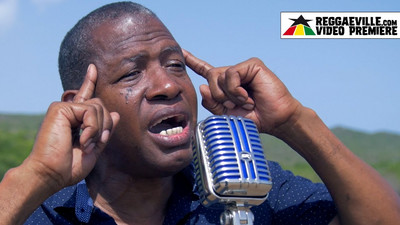Mungo's Hi-Fi ADD
Interview with Mungo's Hi-Fi
03/09/2014 by Angus Taylor
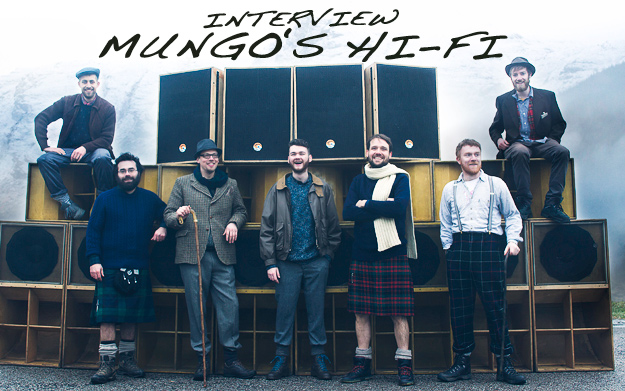
Scotland is proud of its history of inventors – from John Logie Baird to Alexander Graham Bell (and that’s just the B’s). So with that in mind, it’s actually not so surprising with hindsight that a sound system and production house out of Glasgow has become internationally famous for their inventive take on reggae music.
Mungo’s Hi-Fi have been taking their harsh, sparse re-imaginings of Jamaica’s technologically limited yet imaginatively trailblazing 80s digital revolution to a new generation of festival and dance goers.
Via their Scotch Bonnet label they’ve collaborated with everyone from Jamaican veterans Ranking Joe and Sugar Minott to Mavado, Major Lazer and Scotland’s own Soom T.
Their latest album release – out March 24th – pits them in a musical remix battle with their island’s other great non-Caribbean reggae export Prince Fatty. Angus Taylor spoke to Mungo’s co-founder Doug Paine about the journey forward thus far.
Tell us your respective stories of getting into reggae.
Nowadays there’s seven of us and there’s a 16-17 year history since we started this project so there’s quite a lot of stories. But for Tom and I we just started DJing and collecting. We DJ’d other stuff before we got into reggae and then it was the Blood and Fire reissue albums that turned us onto dub and original roots music. We were coming more out of an electro, techno background and the sparse dubs appealed to us on that level. Then there were all the snippets of vocals in there that started to intrigue us more and more.
You and Tom Tattersall DJ’d for a while as Dub Dentists. Did you make people’s teeth rattle with your dub?
(laughs) It wasn’t so much about that. I don’t know what it was, there was the alliteration that appealed to us and also we were quite heavily into Keith Hudson (*Keith Hudson worked as a ghetto dentist before becoming a producer) at the time. That was our first DJ name once we had enough of a collection. It was the realisation that we’d been completely oblivious to this whole world no-one had told us about before - such a rich collection of completely under-represented music and having discovered it ourselves we were keen to show it to other people. It was almost entirely not present on the musical platter available in Glasgow at the time.
But you do make people’s teeth rattle sometimes now with your rig?
(laughs) It’s been known.
So what was the Glasgow scene like when you started in the 90s? What was out there at the time?
There was very little. There was one sound called Rampant Sound who’d been around for a while and were getting equipment together. We got involved and helped them promote nights and flyer, and then we started to collect equipment and bring that down when they needed an amp or a speaker. We began learning the ropes of running live sound with them, although we didn’t DJ so much with them. We were happy to be part of someone playing the music out on a real sound system, and that kind of got us going. We were collecting more bits of sound equipment ourselves to the point in 2000 that we had enough to actually run our own small rig.
Craig McLeod said you found your speakers in a skip?
Yeah, the first speakers were getting thrown out from the university theatre department. They were weird old homemade things with maybe one working driver still in them, so we bought replacement drivers, and fixed them up. We used them for years. They’re still sitting on a shelf, but I don’t think we have any plans for them. They may be collectors’ items one day.
Would you say that people in Glasgow are quite up for trying something new?
Yeah, it’s a really lively city for music in general. There’s good appreciation for good vibes wherever that’s coming from. It’s not very cliquey and people move between scenes. There’s an openness and a lack of scenesters or people wanting to appear cool. It’s a bit of a backwater. People don’t really come to Glasgow to forge a major career or become famous; they’re just getting on with what they want to do. I think it’s quite a fertile environment in a lot of fields. 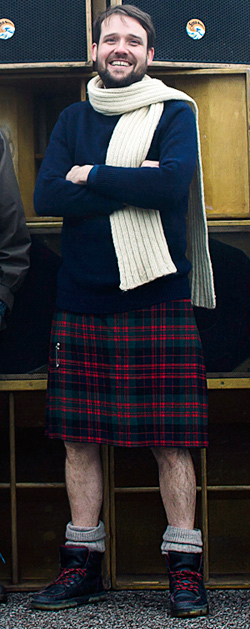 When did the move come towards actual music production?
When did the move come towards actual music production?
Tom was always producing. He produced electro on an old Atari, this massive external hard drive and very basic stuff. I guess they were some of the first days of computer sequencing. Then when we got more into reggae he was keen to produce more of that kind of sound and the early productions - like ING Riddim and Wickedness that got picked up by Dubhead and went on to the Brother Culture album - were pretty much the first finished productions Tom made. He’s been producing solidly all through that time.
Craig joined us in early 2000. We were looking for ways to do a weekly night, so we ended up cooking food in a bar in town; making pizzas and playing reggae and literally running back and forth between the kitchens and the decks. He was at uni at the time, again coming from other kinds of music; he was getting more heavily into the ragga and the dancehall side to it. He asked if he could play as well, and that was handy because we were cooking more pizzas so it was good to have someone else on the decks. He was always interested in production and then, possibly inspired by Tom, he started to get his own setup, and he’s been developing that for 10 years himself.
A lot of non-Caribbean people who get into reggae gravitate to the 70s or Shaka - why were you different?
We just kept exploring. There was a real record shop at the time. We bought the latest 7s, Exterminator or whatever, and whatever reissues or second-hand records we could get our hands on, which wasn’t a lot in their stocks at the time. Then we started getting mail order straight from Jamaica or Soundquake, so we were getting a lot of Jamaican influence at the time. Subsequently that dried up for us as the output from Jamaica appealed to us less and less, both in the lyrical subject matter but also the production style.
I look on the 90s as still quite a fertile period. There is always good music coming out of Jamaica, but I think the centre of gravity started to shift away from Jamaica to producers in Europe predominantly, but all over the globe people who’ve come to reggae from different backgrounds and felt something they connected with, but made their own thing of it. That has been a fascination, and always with original reggae heritage behind it, so we’d get more heavily into rocksteady or ska for a bit, or we’d get heavily into digital steppers for a bit, sort of jumping from one thing to another so nothing got too stale or too set in its ways, which is a bit of a disease in reggae. There’s a lot of people who find a style and then stick to it quite rigidly, to the point that their productions sound almost identical through time. Which is an approach, but it’s not the one we chose.
> When Honest Jon’s put out the Unity reissue I couldn’t believe what I was hearing. <
Jammys is often cited as an influence. How influenced are you by UK stuff like Unity?
When Honest Jon’s put out the Unity reissue I remember going to Rubadub Records, and having a listen and couldn’t believe what I was hearing. The freshness of the sound, I couldn’t believe it had been made 20 years earlier. Again it was just something that I just had no idea was being made in the UK at that time. From Jamaica, I think King Tubby is even more of a role model than Jammys in that he progressed from those early sounds to the later sounds and created something really unique and ground-breaking. It’s such a shame that we lost him.
There’s been a shift towards seeing the digital era as classic since you started – were you ahead of your time?
Possibly. I guess we were just collecting and listening and perhaps we came to things a little bit earlier than other people. But the music is timeless. Some of the digital classics, they’re going to be classics for all time, just like things from the 70s, 60s or 50s. A good tune is a good tune at the end of the day. Some of us, like James, are still more heavily into collecting old and rare records than I am. They’re probably more rubadub than a digital tip at the moment, but I expect that to run its course and then it’ll be something else.
So there’s a sense of motion in what you’re doing all the time?
Yes, a sense of motion and also it is actually connected with the outside world and whatever else is going on in music. We ended up renting out our sound to some of the dubstep nights. Skream came up and played a tiny little basement here and our sound got rented out for that about 2006 or 2007. We were really blown away and you can see the influence that that has on the music we were making. But again we’d look back at someone like Tubby and you think if he’d been around at that time and heard that, he’d have been influenced by that as well.
How do you split your different duties as a team.
We’re all involved in all of it, we all have meetings and try and take important decisions together, and keep it that everyone has a reasonable balance between the boring stuff and the more creative, interesting side.
Now it’s getting more serious, like a real business, unfortunately in a sense but kind of necessarily. Also I see that as part of the ongoing mission within that struggle to set up a label and get the music exposed. It needs a structure, people doing boring stuff, computers, people writing press releases, journalists writing quality articles about it. So quite early on we made the decision that we wanted to get professional, to get to the level that we could make a living out of it, which has taken us something like 15 years. It’s tough in that you have the tension between your passion and a business. You need to turn over a certain amount of money, you have wages to pay.
I’m going to skip though some of your long format releases. How did you link up with Brother Culture and make Mungo’s HiFi Meets Brother Culture? (2002) 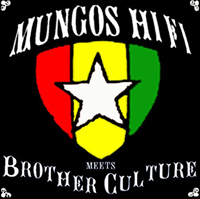 The guy who ran Rampant Sounds brought up Nick Manasseh with Brother Culture around 2000 or 2001. We were running monthly club nights at and asked him to emcee for us. He’s an incredible guy, Culture. He’s done that so much, all over the globe; he’s been happy to work for relatively low fees, he’s worked with quite green crews who possibly don’t really know exactly what they’re doing. In that way he’s been a very special ambassador for reggae music. While he was up we used the time to do some recording as well. We brought him up a few times and soon enough we had enough material for the album.
The guy who ran Rampant Sounds brought up Nick Manasseh with Brother Culture around 2000 or 2001. We were running monthly club nights at and asked him to emcee for us. He’s an incredible guy, Culture. He’s done that so much, all over the globe; he’s been happy to work for relatively low fees, he’s worked with quite green crews who possibly don’t really know exactly what they’re doing. In that way he’s been a very special ambassador for reggae music. While he was up we used the time to do some recording as well. We brought him up a few times and soon enough we had enough material for the album.
The Sound System Champions album (2009) was distributed on CD on Rockers Revolt and was kind of a departure because it had horns. Because that was a vintage ska-type distributor were under any pressure to be less digital? We just made the music we wanted to make. We were in touch with a few horns players locally. The Belly Ska was the main thing for it. We recognised we had a tune to appeal and we wanted live horns on it. We used them on a few of the other tracks as well. There’s a guy called Martin, who I used to run a tea shop with. We set up a Tchai-Ovna and he still runs that, he still plays his saxophone. There’s a guy called Chas who still plays the trumpet with some bands, and there were some other guys. It wasn’t so much a creative process with them. We got them to come in and we told them what we wanted them to play.
We just made the music we wanted to make. We were in touch with a few horns players locally. The Belly Ska was the main thing for it. We recognised we had a tune to appeal and we wanted live horns on it. We used them on a few of the other tracks as well. There’s a guy called Martin, who I used to run a tea shop with. We set up a Tchai-Ovna and he still runs that, he still plays his saxophone. There’s a guy called Chas who still plays the trumpet with some bands, and there were some other guys. It wasn’t so much a creative process with them. We got them to come in and we told them what we wanted them to play.
For the album Forward Ever (2011) you diversified from UK and Jamaican emcees to people of all nationalities and ages. That again was a reflection of who we were working with and recording with. We were running our promotions all the time and wanting to bring different people up and not get too stuck in our ways. So anyone who was doing interesting stuff, we would invite them up and use it as an opportunity to do some recording and eventually filter though the best tunes and put them all together on an album.
That again was a reflection of who we were working with and recording with. We were running our promotions all the time and wanting to bring different people up and not get too stuck in our ways. So anyone who was doing interesting stuff, we would invite them up and use it as an opportunity to do some recording and eventually filter though the best tunes and put them all together on an album.
Who would you say you’ve been most excited about voicing?
(laughs) That’s a really tough question, which I’m going to pretty much sidestep. We brought Ranking Joe up in about 2006 and at the time that was quite a major thing for us, someone who you’ve got to know through records and then actually meeting them and getting to work with them. But then we’ve had so many great veteran artists passing through from Tony Tuff, Sugar Minott, gosh I can’t even remember! Most of them we just ended up doing dubplates with. They’re quite tricky to pin down, or expensive if you want to propose a release with them. Personally, I’m more excited about artists emerging now like Charlie Pee, who is such a UK creation. But again all the people we record with: Mr Williamz, Solo Banton, they’re all capable of incredible work in the studio and live. That’s really important to us, that we’re not just doing something that can be done in the studio, it has to work on a sound system as well.
> We’re not just doing something that can be done in the studio, it has to work on a sound system as well. <
One such person is Kenny Knots who you released Brand New Bangarang with last year.
Kenny was someone we started working with more and more over the years. I guess possibly after the Unity stuff we became more aware of him. He’s one of the best vocalists we work with - incredibly versatile, really original and thoughtful lyrics, and he presents fantastic both in the studio and live. We more consciously wrote with aiming to get an album-worth of material. Unfortunately just at the time that the album was ready to go out he stopped playing live. He stopped touring, I think for general health and personal reasons. So in terms of promoting the album in a way it’s passed quite quietly. I guess financially it’s a shame, but more for what I believe is a quality album. More people should become aware of it. I can still listen to it and enjoy it, no matter how many times I’ve heard the tunes. The good news is we’re getting Kenny up for the first time in years to play a show with us in Glasgow in March, so hopefully we’ll be able to start doing more shows with him now.
Scrubadub Style with Sugar Minott must have been one of the last things he recorded.
We recorded that probably a few months before he passed away. It was quite a shock that he was gone. We felt lucky to have recorded with him. But nowadays that’s the story with a lot of veteran artists, you need to grab them while they’re still there. We nearly booked Wayne Smith for the night in March that Kenny is coming for. Someone else who we’re trying to bring over this year is Johnny Osbourne, who’s only just able to travel again. But people in their early 20s now, they’ve got no idea who Johnny Osbourne is, so as a promoter it’s not very helpful. Someone with this massive value who you need to pay a decent salary to. I’m not one for nostalgia for the sake of it. At the same time, while these guys are still alive it’s good to record with them, ideally something new and fresh rather than just reworking some of their old classics that they must be sick of. Yellowman and Dillinger, they’re coming up to Glasgow next week in fact, so hopefully we’ll be able to get them in the studio, probably just for a dubplate given the time we have.
You’ve made quite a big noise with the online release of the remixes you did for Major Lazer.
Yeah, it’s a funny project. He’s a fan of our music and trying to get us to do stuff with him for a while. He offered this, we took it up and it’s an unusual contract in that it involved us not getting paid. They released it for free without any money changing hands, pretty much just for the promotion of it. But, at the same time, we’re not sorry to get promotion in America where relatively we haven’t toured that much. And it’s also fun to try our hand at something a bit different.
Let’s talk about you and Prince Fatty. I was in his studio last year when he had some of your dubplates, so there’s clearly been some interaction before this album came to be.
A mutual appreciation from a distance. He’s liked what we’ve done and we like what he does, so we thought it would be an idea to get together and hopefully introduce each other to each other’s crowds. And use some of the vast amount of recordings we both have, which are still quite under-listened-to for their quality, so that was the plan. His label Mr Bongo were up for sorting it all out, which takes the work off our hands, which is great.  Listening to the album, he’s given your tunes a swing and a bounce, and you’ve given his a simplicity and a clarity. You can really hear Hollie Cook’s voice and accent in a way that you can’t on his mixes of her.
Listening to the album, he’s given your tunes a swing and a bounce, and you’ve given his a simplicity and a clarity. You can really hear Hollie Cook’s voice and accent in a way that you can’t on his mixes of her.
It’s interesting because there wasn’t much co-ordination of it, we just got the parts and were told to get on with it, and gave him his bits and he did whatever he wanted to do. First we were not really sure if it was going to work as an LP altogether. I mean the two sides have such a different feel to them, but at the same time as an exercise it is a very interesting one to see what can be done with more traditional recording techniques, the kind of sounds you can get with a band, and they both have their own merits. It’s not an either or situation. You can appreciate both and they both have their strengths and weaknesses. He’s all analogue and pretty much all actual physical kit. Whereas we’re mostly computer-based, sample-based; although there’s cost factors involved in that. It’s mainly about the end product that you come up with, more so than how you get there.
Finally, what are your thoughts on Scottish independence?
Funnily enough we were talking about it yesterday. We were wondering whether we should put on a party for the vote. One of our weekly nights is on the day of the vote. We haven’t canvassed opinions in the office fully. I get a sense that we’re more in favour than not. Personally I am more in favour than not. I hear a lot more sense and positive arguments coming out of the Yes campaign and I hear fear tactics and negativity coming from the No campaign. I guess that’s kind of inevitable. A lack of vision and ideas… if No, then what? Why are we together? To do what? And every time you have a London politician talking about it then they increase the risk. They show how much Scotland is a different country that they’ve never been to and have no idea what goes on here. They represent the people here less and less. The government has not been voted for in Scotland and it has a negative impact on society here.
Jamaican independence kick-started a new era for music on the island. Do you think that Scottish independence could do the same?
Yes, creatively and in business and generally in society and in all kinds of ways. It would make people have to quit whinging and actually get on with doing something positive, making their vision come true rather than blaming someone else for why it’s not. I think it would be really positive.




